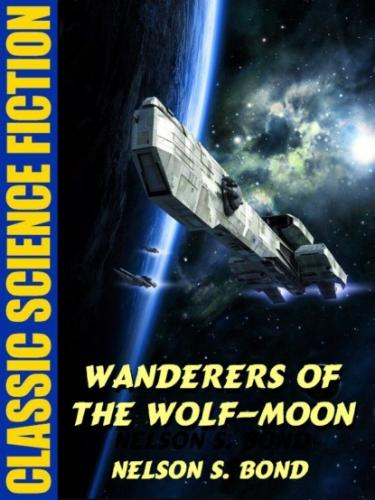Table of Contents
WANDERERS OF THE WOLF MOON
NELSON S. BOND
COPYRIGHT INFORMATION
Copyright © 2020 by Wildside Press LLC.
Introduction opyright © 2020 by John Gregory Betancourt.
Originally published in Planet Stories, Spring 1944.
Published by Wildside Press LLC.
wildsidepress.com | bcmystery.com
INTRODUCTION
Nelson Slade Bond (1908–2006) was an American author who wrote extensively for books, magazines, radio, television, and the stage.
The 1998 recipient of the Nebula Author Emeritus award for lifetime achievement, Bond was a pioneer in early science fiction and fantasy. His published fiction is mainly short stories, most of which appeared in pulp magazines in the 1930s and 1940s. Many were published in Blue Book magazine. He is noted for his “Lancelot Biggs” series of comic space opera stories (some of which were collected in Lancelot Biggs: Spaceman, \ available from Wildside Press) and for his “Meg the Priestess” tales, which introduced one of the first powerful female characters in science fiction.
Bond’s parents, Richard Slade Bond and Mary Bond, were from Nova Scotia, but moved to Scranton, Pennsylvania shortly before his birth in that city. The family later relocated to Philadelphia after World War I. In high school, Bond reviewed plays for The Philadelphia Inquirer. He worked for an insurance company during the Great Depression before enrolling in a college. He attended Marshall College in Huntington, West Virginia from 1932 to 1934. While at Marshall, he contributed to the Huntington Herald Advertiser and edited the college newspaper, The Parthenon. He met his future wife, Betty Gough Folsom, while at Marshall, and they married in 1934.
After graduating, Bond briefly worked for his father’s public relations agency. Shortly after joining, he was offered the position of public relations field director for the province of Nova Scotia. This involved meeting celebrities visiting the province and writing pieces about them that were placed in various periodicals.
He started selling fiction when he realised he could make more money by writing, sending works to newspapers, pulp magazines, and the more upmarket “slick” magazines (so-called because they were printed on clay-coated paper, instead of the much cheaper wood-pulp paper that named the “pulp” magazines.).
He started by writing sports stories but made his first significant sale with “Mr. Mergenthwerker’s Lobblies” (actually a fantasy story) which was published in Scribner’s Magazine in 1937. His first science fiction story was “Down the Dimensions” in the April 1937 issue of Astounding. He only wrote occasional non-fiction once he was established as an author of fiction. Bond wrote and sold more for Blue Book than the pulps, which was not only more prestigious but paid more for his work.
He also published articles on philately and served on the Board of Governors / Board of Directors of the British North America Philatelic Society.
I was fortunate enough to correspond with him briefly before his death, and he became one of the featured authors in Adventure Tales, my pulp fiction magazine. He was a terrific writer and remained mentally sharp when I communicated with him about his pulp work, suggesting which works to reprint.
—John Gregory Betancourt
Cabin John, Maryland.
CHAPTER I
Sparks snapped off the switches and followed him to the door of the radio turret. Sparks was a stunted, usually-grinning, little redhead named Hannigan. But he wasn’t grinning now. He laid an anxious hand on Greg’s arm. “If I was you,” he said, “if I was you, Malcolm, I don’t think I’d say nothing to the boss about this. Not just yet, anyhow.”
Greg said, “Why not?”
Sparks spluttered and fussed and made heavy weather of answering.
“Well, for one thing, it ain’t important. It would only worry him. And then there’s the womenfolks, they scare easy. Which of course they ain’t no cause to. Atmospherics don’t mean nothing. I’ve rode out worse storms than this—plenty of times. And in worse crates than the Carefree.”
Greg studied him carefully from behind trim plasta-rimmed spectacles. He drew a deep breath. He said levelly, “So it’s that bad, eh, Sparks?”
“What bad? I just told you—”
“I know. Sparks, I’m not a professional spaceman. But I’ve studied astrogation as few Earthlubbers have. It’s been my hobby for years. And I think I know what we’re up against.
“We hit a warp-eddy last night. We’ve been trapped in a vortex for more than eight hours. Lord only knows how many hundreds of thousands of miles we’ve been borne off our course. And now we’ve blasted into a super-ionized belt of atmospherics. Your radio signals are blanketed. You can’t get signals in or out. We’re a deaf-mute speck of metal being whirled headlong through space. Isn’t that it?”
“I don’t know what—” began Sparks hotly. Then he stopped, studied his companion thoughtfully, nodded. “O.Q.,” he confessed, “that’s it. But we ain’t licked yet. We got three good men on the bridge. Townsend...Graves...Langhorn. They’ll pull out of this if anybody can. And they ain’t no sense in scaring the Old Man and his family.”
“I won’t tell them,” said Greg. “I won’t tell them unless I have to. But between you and me, what are the odds against us, Sparks?”
The radioman shrugged.
“Who knows? Vortices are unpredictable. Maybe the damn thing will toss us out on the very spot it picked us up. Maybe it will give us the old chuckeroo a million miles the other side of Pluto. Maybe it will crack us up on an asteroid or satellite. No way of telling till it happens.”
“And the controls?”
“As useless,” said Sparks, “as a cow in a cyclone.”
“So?”
“We sit tight,” said Sparks
